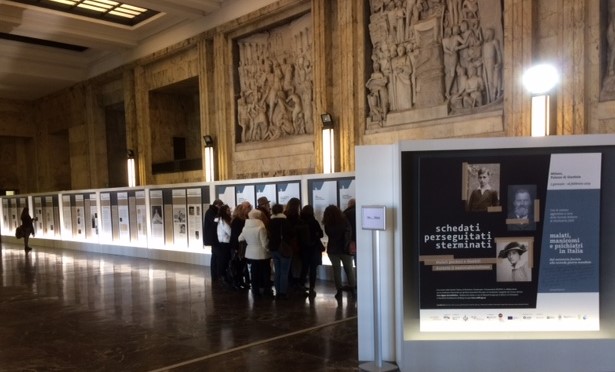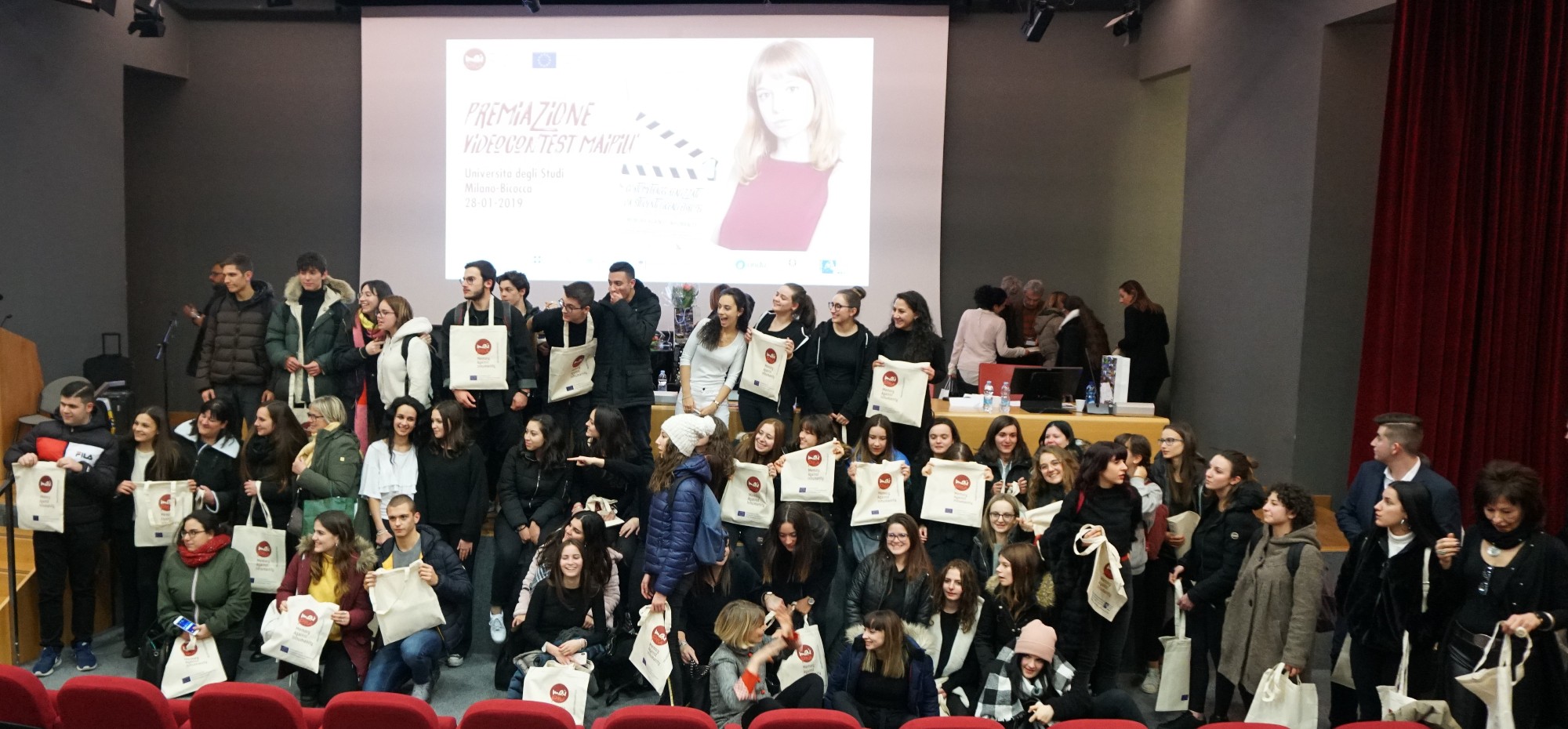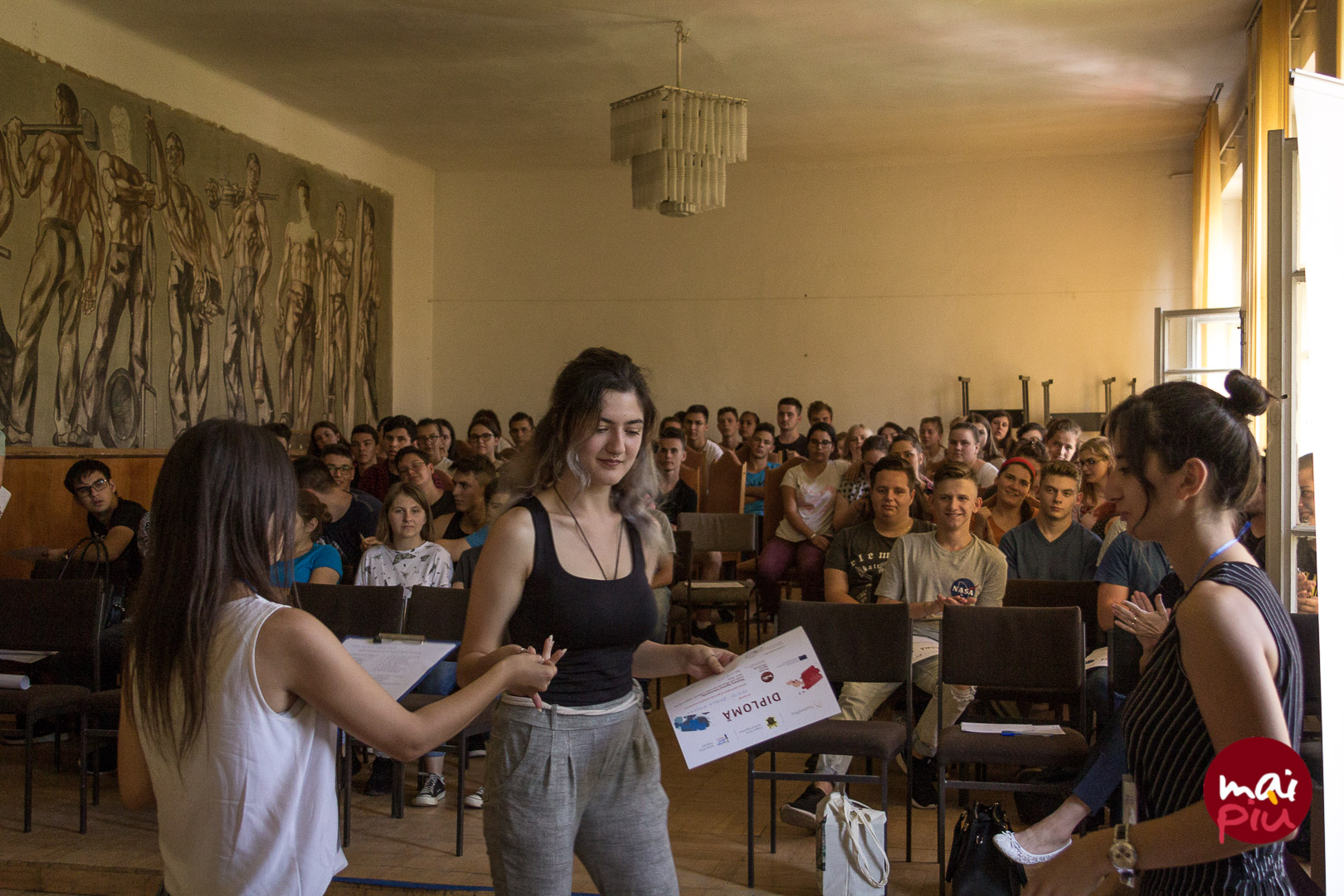Report from project «MAI+, Memory Against Inhumanity: people with mental disorders under totalitarian regimes in Europe, Project no. 589088-CITIZ-1-2017-1-IT-CITIZ-REMEM»
 The project «MAI +, Memory Against Inhumanity: people with mental disorders under totalitarian regimes in Europe, Project no. 589088-CITIZ-1-2017-1-IT-CITIZ-REMEM» was funded with the support of the European Union under the Programme "Europe for Citizens"
The project «MAI +, Memory Against Inhumanity: people with mental disorders under totalitarian regimes in Europe, Project no. 589088-CITIZ-1-2017-1-IT-CITIZ-REMEM» was funded with the support of the European Union under the Programme "Europe for Citizens"
Strand 1 – "European Remembrance"
3 events have been carried out within this project:
Event 1
Participation: According to the Signature sheets Event 1 as a whole involved 1.630 citizens. It was composed by the following project activities:
Project Activity n.1 - Organization of the Opening Symposium on "The Function of European Remembrance"
Participation: According to the Signature sheets the project activity involved 87 citizens, including 52 participants from the City of Bolzano and the Region South Tyrol (Italy), 26 participants from the city of Rome (Italy),1 participant from the city of Milan (Italy), 3 participants from the city of Berlin (Germany), 2 participants from the city of Larissa (Greece), 2 participants from the city of Suceava (Romania), 2 participants from the city of Timisoara (Romania).
Location / Dates: The activity took place in EURAC Resarch Centre (Bolzano, Italy), from 26/11/2017 to 27/11/2017.
Short description: The aim of the event was a) to meet between European partners and organize the Action, b) to start a public discussion on the topic of remembrance relating to the people with mental disorders and disabilities which were persecuted under National Socialism. Stigmatization of the mentally ill led to the Nazi crimes and still exists. Therefore, remembrance of the past is necessary also in this specific field in order to understand the catastrophic consequences of stigmatization. These topics were dealt with in lectures of highly qualified researchers and discussed with the students of the Bozen University and of the EURAC Research Centre. Action Mai Più was presented.
Project Activity n.2 - Organization of the 1st stage of the travelling exhibition “Registered, persecuted, annihilated: The Sick and the Disabled under National Socialism”
Participation: According to the Signature sheets the activity involved 701 citizens, including 681 participants from the City and Province of Bolzano (Italy), 10 participants from the city of Rome (Italy), 2 participants from the town of Aachen (Germany), 2 participants from the city of Larissa (Greece), 2 participants from the city of Suceava (Romania), 2 participants from the city of Timisoara (Romania).
Location / Dates: The activity took place at the Free University of Bozen (Bolzano, Italy), from 10.11.2017 to 10.12.2017
Short description: Remembrance is based on the knowledge of critical historical facts. The aim of the event was to provide citizens with knowledge of a rather unknown chapter of the Nazi persecutions, by organizing the Italian edition of the famous DGPPN exhibition on the persecution of the mentally ill, released in 2014. The Italian edition showed a supplementary section dedicated to Italian psychiatry during fascism. It provides information about the Italian psychiatrists’ responsibility in supporting the Italian Racial laws of 1938. There were 30 guided tours to the exhibition, mainly for school classes. The guides deepened the topics by telling the story of the disabled children from South Tyrol which in the 1940’s were deported to Germany to be “eliminated”.
Project Activity n.7 - Organization of the 2nd stage of the travelling exhibition “Registered, persecuted, annihilated: The Sick and the Disabled under National Socialism”
Participation: According to the Signature sheets the activity involved 842 citizens who visited the exhibition. They mostly came from Milan and the Region of Lombardy (Italy).
Location / Dates: The activity took place in Palazzo di Giustizia (Milan, Italy), from 07/01/2019 to 16/02/2019.
Short description: The aim of the event was to start and promote a remembrance process in the city of Milan and the Lombardy Region by providing knowledge of the Nazi persecutions of the mentally ill and the role played by the Italian psychiatry during fascism. The exhibition venue was highly significant. Choosing the most famous Court of Justice nationwide, the “Palazzo di Giustizia” in Milan, meant to remember the atrocities in the same place where some of them were ordered during fascism. The exhibition was introduced by a symposium on the historical responsibility of psychiatry and on the urge to recognize and oppose contemporary forms of fascism. The speakers were renowned psychiatrists, politicians and legal experts. There were 42 guided tours to the exhibition for school classes, during which trained guides underlined the utter inhumanity shown by Nazi “eugenics” and Italian “Racial laws” and discussed the contents of the exhibitions with students of age 14-19.
Event 2
Partecipation: Event 2 as a whole involved1166 citizens. It was composed by the following project activities:
Project Activity n.3 - Educational workshops in Italy: “What do you know about mental disorder?” and “The concepts of inhumanity and humanity”
Participation: The project activity involved 220 citizens from the citiy of Rome and 94 from Milan (Italy), out of the total 243 were High School students age 17-19.
Location / Dates: The activity took place in the following 7 Roman High schools: “Benedetto da Norcia”, “Lucrezio Caro”, “Luigi Einaudi”, “G. Keplero”, “Maria Montessori”, “Bertrand Russell”, “Giulio Verne” and in the Sala Protomoteca of the Capitol Hill (Campidoglio) , between 27/11/2017 and 25/05/2018 in Rome and 2 schools in the Milan area (Italy) : Liceo Scientifico Niccolò Copernico in Brescia and Liceo G. Galilei in Gozzano plus the Goethe Institut.
Short description: The aim of the event was to promote remembrance culture among young people by giving them knowledge of the persecutions of people with mental disorders during nazism and fascism. In seven Roman High school classes, information about the contents of the exhibition were given. Before this, the students discussed their opinions about the mentally ill with a team of psychologists and psychiatrists. They filled in a questionnaire on stigma which was prepared for the Mai Più Action. The students’ answers to the questionnaire’s items in all participating countries were then evaluated by a research group.
As a further step, students were given information about the strategies of dehumanization which “justify” inhuman actions like the Nazi crimes. In each school in Rome, students then started a video workshop during which, with the help of a video tutor, they realized short films of 3-10 minutes. The shorts either dealt with the history and the social perception of people with mental illness or displayed the students’ ideas about inhumanity. 11 short films were shot by the Roman students. They were screened at the Roman Capitol Hill on May 25, 2018 in the presence of all participating school classes.
Project Activity n.4 - Educational workshops in Greece: the perception of mental disorders/Mental health "care" during totalitarianism /Filmography on people with mental disorders
ACT 4.1
Participation: The activity involved 95 citizens from the city of Larissa (Greece), of which 85 were Secondary Schools Students aged 15-18, together with teachers and educators
Location / Dates: The activity took place in 2 Secondary Schools (Lyceum) of Larissa (Greece) from 23/01/2018 to 21/05/2018
Short description: The primary goal of these workshops was to raise awareness among young people on the inhumanity practices regarding mental disorder and provide an ideal opportunity to network in order to introduce the contents of the exhibition on the Nazi crimes against sick and disabled people, which had been explained in the Bolzano meeting.
In cooperation with two secondary level public schools in Larissa, the scientific personnel of EEPEK carried out two educational workshops aimed at educating and activating students who were interested and would do research on mental health “care” during totalitarianism and on the concepts of inhumanity and humanity -related issues for the Filmography on people with mental disorders for the events of the “MAI+”.
The school programme was based on personal cases, with the intention of being as interactive as possible. This gave participants the opportunity to take active part in the discussions. A final common message was presented and a high level of quality at each individual workshop was maintained.
The first training on 31 of January 2018, 2, 7, 9, 14, 16 and 28 of February 2018, on 2, 7, 9, 14 and 16 of March 2018 and on 20, 21 and 28 of April 2018 took place at the facilities of the 2nd Secondary Public School of Larissa and addressed students (51), parents and teachers from this school society in Larissa, specialist psychologists, video experts and social and political scientists.
The second training on 23, 29 of January 2018, 5, 12, and 26 of February 2018, on 12 and 19 of March 2018, on 23 of April 2018 and on 14 and 21 of May 2018 took place at the facilities of the 10th Secondary Public School of Larissa and addressed students (34), parents and teachers from this school society in Larissa, specialist psychologists, video experts and social and political scientists. 4 short films were shot by the Greek students.
ACT 4. 2
Participation: The activity involved 30 citizens, including 15 disadvantaged students and 15 teachers, from the city of Larissa (Greece)
Location / Dates: The event took place in the Special Professional School of Larissa (Greece), on 21/05/2018
Short description: The aim of the event was the presentation of the persecutions of people with mental disorders during Nazism and Fascism.Students of the 2nd Lyceum of Larissa in cooperation with the scientific personnel of EEPEK presented the MAI+ project, the Greek students’ activities regarding the project and screening of the 4 short films which were shot by the Greek students. The event took place at the Special Professional School of Larissa on 21 of May 2018.
Project Activity n.5 - Educational workshops in Romania: the perception of mental disorders/Mental health "care" during totalitarianism /Filmography on people with mental disorders
ACT 5.1
Participation: The activity involved 34 citizens from the city of Timisoara (Romania), out of which 29 were High School students age 16-18.
Location / Dates: The event took place at the Technical College Emanuil Ungureanu in Timisoara (Romania), from 26/03/2018 to 30/03/2018
Short description: The aim of the event was to promote remembrance culture among young people by giving them knowledge of the persecutions of people with mental disorders during Nazism and Communism. During five days, the 29 youngsters participated in non-formal educational activities which included exploration of the historical facts related to the Nazi and Communist persecution, learning about mental illnesses and discrimination, learning about film making and finally the actual filmmaking, which expressed the young people’s perspective on two main topics: human rights and the inhuman treatment of the people with mental illnesses during the Communist regime. The young participants created two scripts and, during two days, March 30th and May 6th, they realized two short films. The public screening of the two films took place on June 20th, 2018, at the Technical College Emanuil Ungureanu, in Timisoara, in the presence of over 70 high-school students.
ACT 5.2
Participation: 75 students were involved.
Location / Dates:
Sports High School Suceava (Romania) between February and June 2018
Short description:
After the Bolzano Meeting we established our national project team at Sports High School Suceava, Romania. We had some meetings to involve other 2 schools in project activities. We presented the project to local community here in Suceava county, Romania. We selected 2 schools from Suceava county to be our partner in the project activities. We select 75 students from these 3 schools. Between February to June 2018 we organized the workshops with the students on the topics “Psychology and mental health” with the school psychologists: Lacramioara Plugariu, Delia Dascălu and Maria Pavelescu and “Historical facts and research on treatment of people with diagnosed with mental disorder during communism / totalitarian regimes in Europe” with Lăcrămioara Plugariu, Delia Dascălu and Maria Pavelescu. Video workshops were conducted with Tudor Catargiu and Mihaela Nichitean.
ACT 5.3
Participation: The conference World Day of Mental Health organized in Suceava (Romania) involved 49 persons: teachers, psychologists, members of the local community.
Location / Dates:
The event took place on 10 October 2018 at Guidance and Councelling Resource Center in Suceava (Romania)
Short description:
The goal of these workshops was to inform about the results of questionnaires we applied in March with students and how we can change students attitude about persons with mental disorder. We invited a psychiatrist, school inspectors, and people from local media and from Suceava University. We also presented the results of study visit to Auschwitz and informed about the movies the students had realized during the Mai+ workshops and gave the link to the videos.
ACT 5.4
Participation: The event involved 162 students together with teachers from Liceul cu Program Sportiv Suceava and school psychologists from the Guidance and Councelling Resource Center Suceava (Romania).
Location / Dates:
The event took place in aula of Liceul cu Program Sportiv from Suceava (Romania) on 30 October 2018.
Short description: The aim of the event was to provide knowledge of the persecutions of people with mental disorders during Nazism and Fascism. Students from Liceul cu Program Sportiv from Suceava presented the MAI+ project, their activities regarding the project and the short films which they had realized.
ACT 5.5
Participation:
The event involved 34 teachers, local community members from Suceava County (Romania).
Location / Dates: The event took place in Suceava, multimedia room in Liceul cu Program Sportiv Suceava in Suceava (Romania), on 27 of December 2018.
Short description: The goal of the event was to promote tolerance, acceptance of people that are different and to prevent discrimination in all forms. We presented the activities of the MAI + project and provided information about what happened to people with mental illness during the periods of totalitarianism in the EU.
Project Activity n.6 - Educational workshops in Slovenia: the perception of mental disorders/mental health "care" during totalitarianism /filmography on people with mental disorders
Participation: The programme involved 373 citizens, including:
72 participants from the city of Zagorje (Slovenija) , 301 participants from the city of Koper (Slovenija) from two different schools
Location / Dates: The event took place in from 1/10/2018 to 26/10/2018 in the following schools:
Srednja šola Zagorje (Slovenia) - Srednja tehnična šola Koper (Slovenia) - Srednja ekonomsko – poslovna šola Koper (Slovenia).
Short description: The aim of the event was to inform students of secondary schools about the project and talk with them about the topics of this project. During the 4 hour lecture they had:
- A video presentation (winning video of Slovenia, other videos including all main goals of this project)
- A presentation of the cruelties during WWII and how cruelty nowadays is done
- Discussion on the mentioned topics
- Further information, where they can get more information to help people nowadays
- Video laboratories for the participation in the international video contest
Event 3
Participation: According to the Signature sheets Event 3 as a whole involved 172 citizens. It was composed by the following project activities:
Project Activity n.8 - Organization of the Closing Symposium on "Humanity/Inhumanity”
ACT 8.1
Participation: The Closing Symposium involved 172 participants, including 82 participants from Milan and the Region of Lombardy (Italy), 51 participants from the city of Rome and the Region of Latium (Italy), 7 participants from the city of Koper (Slovenia), 14 participants from the city of Larissa (Greece), 18 participants from the cities of Suceava and Timisoara (Romania). More than 130 High School students participated in the event.
Location / Dates: The event took place at the Auditorium G.Martinotti, University of Milan-Bicocca on 28/01/2019 in Milan (Italy)
Short description: The aim of the event was
- to trace and discuss the strategies of dehumanization which permit inhuman actions of all sorts, in the past as well in the present, in order to “vaccinate” young people against these strategies. The reasons why people start to dehumanize others were examined and, on the other hand, the idea of “humanity” was investigated. A master lecture was held by the most renowned Italian researcher in this field, Chiara Volpato (University Bicocca).
- b)to screen and award the winners of the international Video Contest (see below), in the presence of delegations of students and teachers from the participating European countries Greece, Italy, Romania and Slowenia. The awards were given by representatives of the Embassies of these countries. The Grand Jury’s Award was given by a group of film experts and directors from 8 European countries. The Slovenian students won the Global Award, while an Italian school class was awarded the Grand Jury’s prize.
ACT 8.2
The “Mai Più Video Contest”, took place in the months before the Closing Symposium and was connected to Event 3.
Participation: The Video Contest counts 45.122 visualizations on the social media Facebook and Youtube. Among the 22.190 visualizations on Facebook, 7.311 were from Greece, 4.211 from Italy, 5.575 from Slowenia, 906 from Romania. The remaining 4.187 visualizations came from 17 different countries (13 European countries).
Location / Dates: The organization of the Video Contest started in October 2018. The Video Contest took place on the social media Facebook, Youtube and Instagram from 18/12/2018 to 20/01/2019 (youtube: ProgettoMaiPiù).
Short description: The aim of the event was to disseminate knowledge of the persecution of the mentally ill during totalitarian regimes in Europa and to rise interest towards the item of inhumanity today, by posting the 21 short films realized during the Mai Più Educational workshops on the social media. All short films were subtitled in English. Dissemination was entrusted to the students themselves. The short films which obtained the highest numbers of Visualizations, Likes and Shares were to win the Mai Più Global Award. There was to be a National Award for each participating country too.




